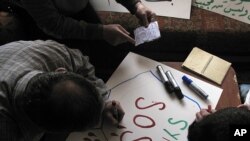United Nations monitors are headed to Syria in a mission aimed at decreasing violence in the country.
Their arrival comes as Syrian forces are launching fresh daily attacks in several rebellious regions, despite President Bashar al-Assad agreement to an April 10 cease-fire brokered by U.N.-Arab League envoy Kofi Annan.
The peace plan calls on the government to cease fire on April 10, with opposition forces following suit.
But fierce clashes between pro- and anti-government forces continued across the country Wednesday. Rights groups and activists said at least 50 people were killed in the latest round of violence.
Russian Foreign Minister Sergei Lavrov warned Western and Arab nations against arming Syrian rebels. Speaking on a trip to Azerbaijan Wednesday, Lavrov said "even if the Syrian opposition is armed to the teeth, it will not be able to defeat the Syrian army and the carnage will go on for years."
Lavrov also said a foreign military intervention would lead to even more disastrous consequences for Syria, which has seen a yearlong uprising against President Bashar al-Assad that has killed more than 9,000 people.
Also Thursday, Annan is to address the U.N. General Assembly on the situation in Syria.
Middle East analyst Christopher Phillips said the government crackdown will likely to continue until April 10.
"Given the regime has taken a largely militaristic approach to this uprising, you suspect their intention is to continue to oppress and be relatively violent right up to the 10th deadline as a means to crush the opposition as best it can before that deadline comes about," he said.
Phillips, an international relations lecturer at the University of London, said it is doubtful that Syria will uphold the provisions of Annan's peace plan. "It's highly unlikely that he [Assad] will abide by the terms entirely. I think this regime has decided a long time ago that its best route for survival is the military option. Its acceptance of this plan appears to be a play for time as they have done in the past with other plans such as the Arab League plan," he said.
| Join the conversation on our social journalism site - Middle East Voices. Follow our Middle East reports on Twitter and discuss them on our Facebook page. |




